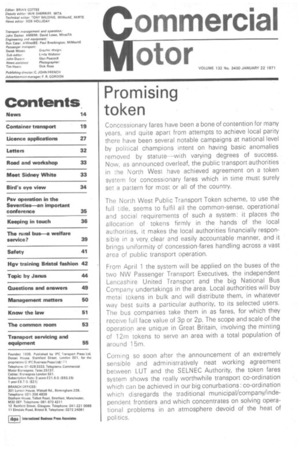Promising token
Page 15

If you've noticed an error in this article please click here to report it so we can fix it.
Concessionary fares have been a bone of contention for many years, and quite apart from attempts to achieve local parity there have been several notable campaigns at national level by political champions intent on having basic anomalies removed by statute--with varying degrees of success. Now, as announced overleaf, the public transport authorities in the North West have achieved agreement on a token system for concessionary fares which in time must surely set a pattern for most or all of the country.
The North West Public Transport Token scheme, to use the full title, seems to fulfil all the common-sense, operational and social requirements of such a system: it places the allocatIon of tokens firmly in the hands of the local authorities, it makes the local authorities financially responsible in a very, clear and easily accountable manner, and it brings uniformity of concession-fares handling across a vast area of public transport operation.
From April 1 the system will be applied on the buses of the two NW Passenger Transport Executives, the independent Lancashire United Transport and the big National Bus Company undertakings in the area. Local authorities will buy metal tbkens in bulk and will distribute them, in whatever way best suits a particular authority, to its selected users. The bus companies take them in as fares, for which they receive full face value of 3p or 2p. The scope and scale of the operation are unique in Great Britain, involving the minting of 12m tokens to serve an area with a total population of around 15m.
Coming so soon after the announcement of an extremely sensible and administratively neat working agreement between LUT and the SELNEC Authority, the token fares system shows the really worthwhile transport co-ordination which can be achieved in our big conurbations: co-ordination which disregards the traditional municipal/company/independent frontiers and which concentrates on solving operational problems in an atmosphere devoid of the heat of politics.




































































































